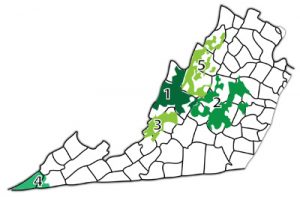
Learn about the electric membership cooperatives that serve Virginians and communities across the region on our Energy Savings for Appalachia page.
When it comes to energy efficiency, Virginia’s policymakers could do more, a lot more. The commonwealth came in 37th place on the American Council for an Energy-Efficient Economy’s (ACEEE) most recent state scorecard, which ranks states by energy efficiency policies.
The scorecard follows up on a report the group published in 2008, stating that Virginia could meet 31 percent of projected demand by 2025 with “cost-effective” energy efficiency initiatives.
The report defines cost-effective measures as those that would cost less to implement than what the average resident currently pays for electricity. In Virginia, that is slightly over 10 cents per kilowatt hour meaning that for less than 10 cents per kilowatt-hour, Virginia could avoid 31 percent of projected electricity demand. In fact, 85 percent of the recommendations would cost less than eight cents per kilowatt hour.
Contrasting what is possible with what would have a chance in the Virginia legislature, the report also looked at a less aggressive option of 19 percent efficiency by 2025. The costs for these measures would all be less than 8 cents per kilowatt hour and many would be under three cents — or less than one-third of what it would cost to fill that gap by burning coal and natural gas.
Instead, the Virginia legislature in 2007 chose a non-mandatory goal of 10 percent energy efficiency by 2022 (Governor Bob McDonnell vetoed an effort to make it mandatory in 2009). By any standards, this goal should be readily achievable, but, after six years, Virginia is far off the track for meeting that goal. The most recent estimates suggest that Virginia has achieved a paltry one percent of demand through efficiency.
With Virginia’s abundant energy efficiency potential as background, Senator Mark Warner used Earth Day to point out how far behind we are and the incredible opportunity we have in this growing market.
In an op-ed for Politico titled Reboot Earth Day, Warner writes that “Instead of waste, we could be overseeing an energy and innovation boon, driving job creation, fiscal strength, energy security and independence, and cleaner air and water” and notes that “policy makers should rethink how we regulate our energy market. The antiquated regulatory paradigm that ties utility profits to generating and selling more energy is actually encouraging waste and stalling investment and innovation.”
Senator Warner has made few friends in the environmental movement lately, considering his support of the Keystone XL pipeline project, but his support for energy efficiency may help heal the wound. Or, perhaps the senator just wants to spur the job growth that comes with energy efficiency and the reduced costs as compared to building more natural gas and nuclear power plants.
This is a view that resonates with both of Virginia’s gubernatorial candidates – Ken Cuccinelli and Terry McAuliffe, despite the incredible divide in their other political views. I’ve met with both the Republican and Democratic candidates’ staff, and if there is one point of agreement, it’s saving money for Virginians. A nuclear power plant costs billions – in fact, cost overruns generally are in the billions.
Under the current system, this is great for a utility, which is guaranteed profit on those billions from their ratepayers. In contrast, energy efficiency requires a much lower investment, provides financial benefits to the customer, and could create thousands of jobs throughout the state.
Appalachian Voices recently launched Energy Savings for Appalachia campaign will work to highlights these benefits and grow the energy efficiency industry and opportunities in (and the cleaner air and water, and the jobs!) Virginia and throughout Appalachia.
Read about Appalachia’s energy efficiency potential in the The Appalachian Voice: The Dollars and Sense of Energy Savings.



Leave a Reply